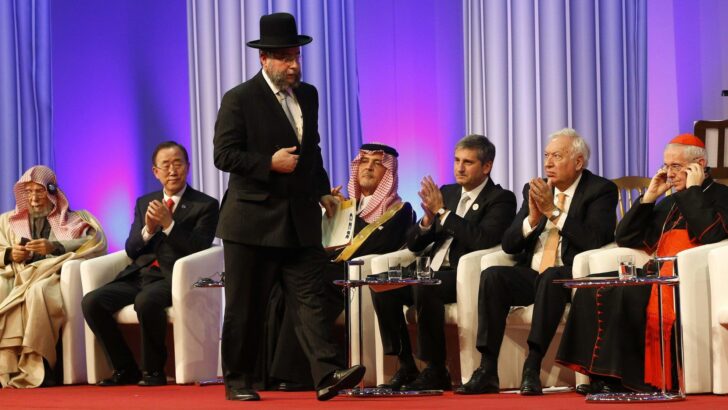This year’s International Charlemagne Prize goes to Pinchas Goldschmidt, Chairman of the European Rabbinical Conference. He uses his acceptance speech to make a fiery plea in favour of human rights.
Aachen (KNA) The Chairman of the European Rabbinical Conference (CER), Pinchas Goldschmidt (60), has called for a resolute fight for democracy and human rights and against hatred of Jews as the new Charlemagne Prize winner. The Charlemagne Prize for him and for all Jewish communities is “an encouragement in a challenging time”, he said in his acceptance speech in Aachen on Thursday.
The Charlemagne Prize is an honour that is an obligation, the rabbi warned. The justification for the award states that the aim is to send a signal that Jewish life is a natural part of Europe and that there should be no room for anti-Semitism: “That sounds like a fairytale. Unfortunately, the opposite is the case. Jewish life is not a matter of course, and there is plenty of room for anti-Semitism in Europe.”
Hatred of Jews has never been dead: “But since the Islamist pogrom in Israel on 7 October 2023, it has flared up in a way that seriously threatens the security and freedom of Jewish life – especially in Europe.” And what is being done about it is far from enough: “Jewish life, from daycare centres to retirement homes, can only take place under the strictest security precautions. Hatred of Jews rages on the streets, at demonstrations where people openly call for the murder of Jews.”
Jews in fear – for themselves, their children and grandchildren
There are also “highly educated anti-Semites at universities who are taking the air out of their Jewish fellow students”. Jewish people did not dare to be recognisable as Jewish. They lived in fear and feared for their future – for themselves, their children and grandchildren: “You, ladies and gentlemen, must do something to counter this. The Jewish community cannot and it is not their task. It is the task of their home countries and home societies to defend themselves against the enemies of European values.”
Anti-Semitism must be recognised, named and combated in all its forms. This includes the age-old racist right-wing extremist form, but hatred of Jews also appears as “anti-Zionism” and “criticism of Israel” and seeps into disciplines such as postcolonial studies.
In the end, the radicals agreed on the lowest common denominator, hatred of Jews, Goldschmidt went on to criticise: “Or precisely: hatred of Israel – paradoxically the only democracy in the Middle East that is at the forefront of the fight for Western values.”
Criticising Israel and making demands of Hamas
He also has problems with the current Israeli government, he added – and “the images from the Gaza Strip don’t leave me cold either, how could they”? But it is obvious: “Hamas started the war. And it could end it immediately. By releasing the hostages, laying down their arms and giving their own people a real life.”
Anti-Semitism is not first and foremost the problem of the Jews, but the problem of the societies in which it prevails: “It is a seismograph for their condition. Extremism from the right and left and, in particular, radical political Islam – the perversion of a religion – not only jeopardise Jewish Europe. They threaten the security, freedom and indeed the future of Europe as a whole.”
Goldschmidt concluded by demanding that all freedom-loving democrats must finally take up arms – both internally and externally: “When, I ask you, should ‘never again’ be, if not now?”


 Rabbi Pinchas Goldschmidt walks next to Abdullah Al Turki, president of the Islamic League; U.N. Secretary-General Ban Ki-moon; Saudi Arabia's foreign minister, Prince Saud al-Faisal; Austrian Foreign Minister Michael Spindelegger; Spanish Foreign Minister Manuel Garcia-Margallo Marfil; and Cardinal Jean-Louis Tauran, during the opening ceremony of the King Abdullah Bin Abdulaziz International Center in Vienna Nov. 26, 2012. Photo: CNS photo/Leonhard Foeger, Reuters
Rabbi Pinchas Goldschmidt walks next to Abdullah Al Turki, president of the Islamic League; U.N. Secretary-General Ban Ki-moon; Saudi Arabia's foreign minister, Prince Saud al-Faisal; Austrian Foreign Minister Michael Spindelegger; Spanish Foreign Minister Manuel Garcia-Margallo Marfil; and Cardinal Jean-Louis Tauran, during the opening ceremony of the King Abdullah Bin Abdulaziz International Center in Vienna Nov. 26, 2012. Photo: CNS photo/Leonhard Foeger, Reuters 